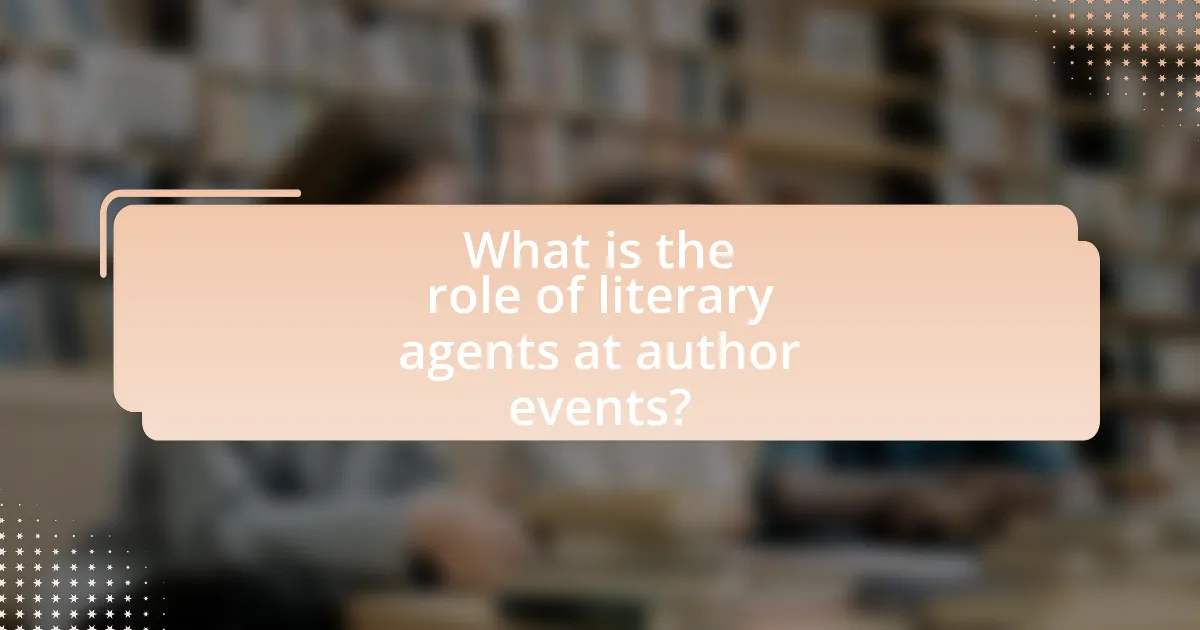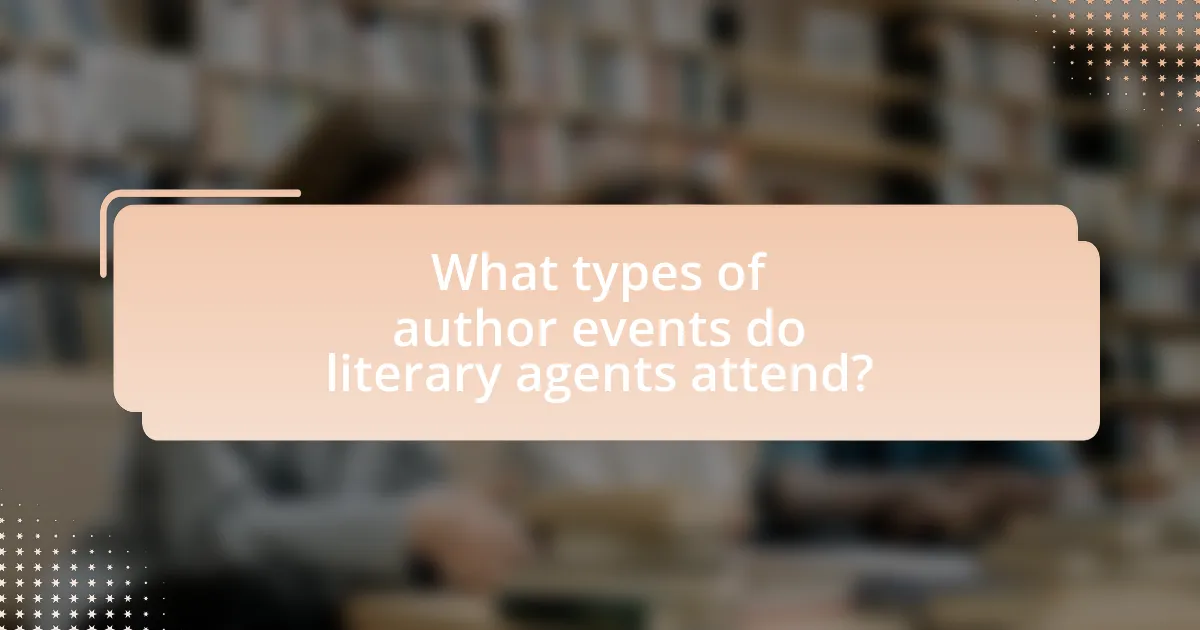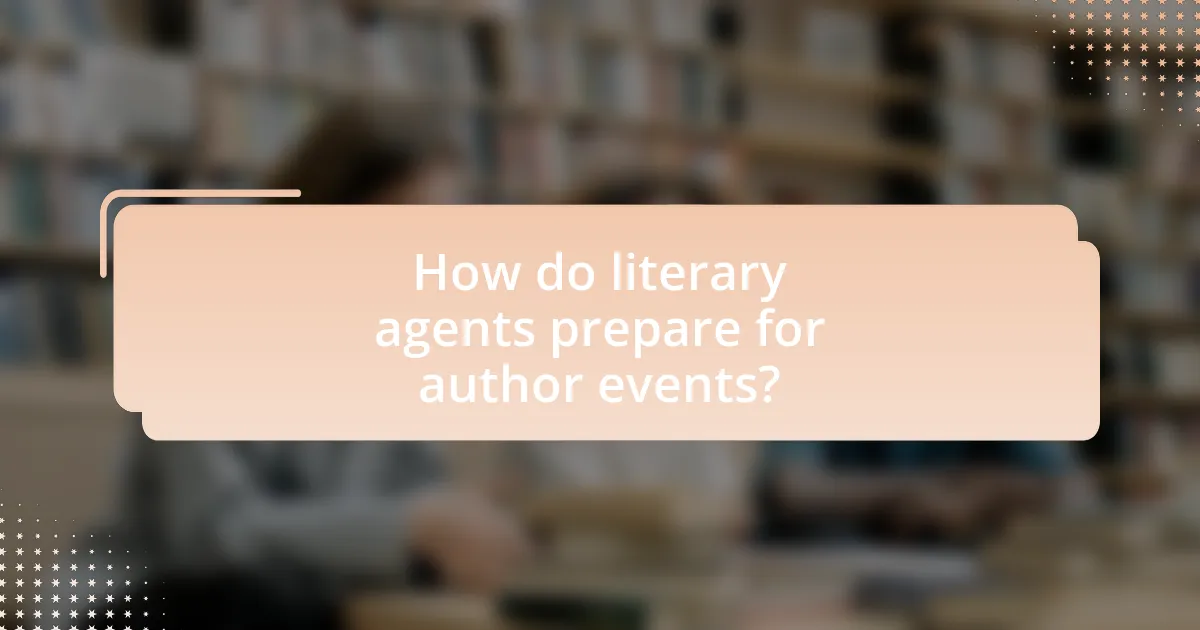Literary agents play a vital role at author events by connecting authors with industry professionals, such as publishers and media representatives, while representing the authors’ interests. They facilitate networking opportunities, provide logistical support, and enhance authors’ visibility through strategic promotion and guidance on presentation skills. Agents attend various events, including book launches and literary festivals, to maximize opportunities for their clients, ensuring effective communication and engagement with audiences. Their expertise in the publishing industry is essential for navigating the complexities of these events, ultimately benefiting authors’ careers through increased exposure and potential collaborations.

What is the role of literary agents at author events?
Literary agents play a crucial role at author events by facilitating connections between authors and industry professionals, including publishers and media representatives. They often represent the author’s interests, ensuring that the event aligns with the author’s goals, such as promoting a book or expanding their audience. Additionally, literary agents may provide guidance on presentation and networking strategies, enhancing the author’s visibility and marketability. Their expertise in the publishing industry allows them to navigate the complexities of author events effectively, maximizing opportunities for their clients.
How do literary agents support authors during events?
Literary agents support authors during events by facilitating networking opportunities and providing logistical assistance. They often arrange meetings with publishers, media, and other industry professionals, enhancing the author’s visibility and potential for future collaborations. Additionally, agents may help authors prepare for public speaking engagements by offering guidance on presentation skills and content delivery, ensuring that the author effectively communicates their message. This support is crucial, as it can lead to increased book sales and broader audience engagement, ultimately benefiting the author’s career trajectory.
What specific tasks do literary agents perform at author events?
Literary agents perform several specific tasks at author events, including facilitating networking opportunities, promoting the author’s work, and managing event logistics. They connect authors with industry professionals, such as publishers and booksellers, enhancing the author’s visibility. Additionally, agents often handle the scheduling of events, ensuring that authors are prepared and that promotional materials are available. These tasks are crucial for maximizing the impact of the event and supporting the author’s career.
How do literary agents enhance the author’s visibility at events?
Literary agents enhance an author’s visibility at events by leveraging their industry connections and expertise to secure speaking engagements, book signings, and media coverage. Agents often have established relationships with event organizers, allowing them to position their authors in prominent roles that attract attention. For example, an agent may negotiate for an author to be featured in a panel discussion at a major literary festival, which can significantly increase the author’s exposure to potential readers and industry professionals. Additionally, agents can facilitate interviews and press opportunities during these events, further amplifying the author’s presence and reach.
Why are literary agents important for authors at events?
Literary agents are important for authors at events because they facilitate networking opportunities and provide industry insights. At events, agents connect authors with publishers, editors, and other industry professionals, which can lead to potential book deals and collaborations. Additionally, agents offer valuable advice on market trends and audience engagement, helping authors navigate the complexities of the publishing landscape. Their expertise and established relationships within the industry enhance an author’s visibility and credibility, making them a crucial asset during such gatherings.
What advantages do authors gain by having a literary agent present?
Authors gain several advantages by having a literary agent present, including access to industry connections, negotiation expertise, and marketing support. Literary agents have established relationships with publishers, which can facilitate better opportunities for authors to get their work noticed and accepted. Additionally, agents possess negotiation skills that help authors secure favorable contract terms, ensuring that their rights and financial interests are protected. Furthermore, agents often assist in marketing strategies, leveraging their knowledge of the market to promote the author’s work effectively. These advantages collectively enhance an author’s chances of success in a competitive literary landscape.
How do literary agents help in networking opportunities at events?
Literary agents facilitate networking opportunities at events by leveraging their industry connections to introduce authors to publishers, editors, and other influential figures. They often have established relationships within the literary community, which allows them to create valuable introductions that authors might not achieve on their own. For instance, agents frequently attend book fairs, literary festivals, and conferences, where they can connect their clients with key industry players, enhancing the authors’ visibility and potential for collaboration. This networking is crucial, as it can lead to publishing deals, partnerships, and mentorship opportunities that significantly benefit an author’s career trajectory.

What types of author events do literary agents attend?
Literary agents attend various types of author events, including book launches, literary festivals, writing conferences, and author signings. These events provide agents with opportunities to network with authors, publishers, and other industry professionals, as well as to discover new talent and trends in the literary market. For instance, literary festivals often feature panels and discussions where agents can engage with authors and gauge public interest in different genres. Additionally, writing conferences allow agents to conduct pitch sessions, where they can evaluate potential manuscripts and meet aspiring writers directly.
How do literary agents choose which events to participate in?
Literary agents choose events to participate in based on their relevance to their authors’ genres, networking opportunities, and potential for business development. Agents assess the event’s audience demographics, the presence of key industry figures, and the overall reputation of the event to ensure it aligns with their strategic goals. For instance, attending genre-specific conventions allows agents to connect with potential clients and industry professionals, enhancing their ability to represent authors effectively. Additionally, events that feature prominent speakers or panels can provide valuable insights into market trends, further informing their decisions.
What factors influence a literary agent’s decision to attend an event?
A literary agent’s decision to attend an event is influenced by factors such as networking opportunities, the potential for discovering new talent, and the relevance of the event to their current client roster. Networking opportunities are crucial as agents seek to connect with authors, publishers, and other industry professionals, which can lead to future collaborations. The potential for discovering new talent is significant, as agents are always on the lookout for fresh voices and innovative ideas that align with market trends. Additionally, the relevance of the event to their current client roster ensures that agents can support their authors effectively and stay informed about industry developments that may impact their clients’ careers.
How do different types of events serve various author needs?
Different types of events serve various author needs by providing tailored opportunities for networking, promotion, and skill development. For instance, book fairs allow authors to showcase their work to a broad audience, enhancing visibility and sales potential. Workshops focus on skill enhancement, offering authors insights into writing techniques and industry trends. Literary festivals create a platform for authors to engage with readers and other writers, fostering community and collaboration. Each event type addresses specific author goals, such as increasing readership, improving craft, or building professional relationships, thereby fulfilling diverse author needs effectively.
What are the common formats of author events that involve literary agents?
Common formats of author events that involve literary agents include panel discussions, book signings, workshops, and one-on-one pitch sessions. Panel discussions typically feature multiple authors and agents discussing industry trends, while book signings allow authors to interact with readers and agents. Workshops often focus on writing techniques or publishing insights, providing valuable information from agents. One-on-one pitch sessions enable authors to present their work directly to agents for feedback and potential representation. These formats facilitate networking and knowledge exchange between authors and agents, enhancing the publishing experience.
What is the role of literary agents in book signings?
Literary agents play a crucial role in book signings by facilitating the event’s organization and promoting the author’s work. They coordinate logistics, such as scheduling and venue selection, ensuring that the signing aligns with the author’s marketing strategy. Additionally, literary agents leverage their industry connections to attract media attention and potential readers, enhancing the visibility of the event. Their involvement often leads to increased book sales and a stronger author brand, as they understand market trends and audience engagement strategies.
How do literary agents contribute to panel discussions and workshops?
Literary agents contribute to panel discussions and workshops by providing industry insights and expertise on the publishing process. They share knowledge about market trends, helping authors understand what publishers are looking for, which can enhance an author’s approach to writing and pitching their work. Additionally, agents often facilitate networking opportunities, connecting authors with other industry professionals, which can lead to potential collaborations or representation. Their experience in negotiating contracts and understanding audience preferences allows them to offer practical advice that is valuable for both emerging and established authors.

How do literary agents prepare for author events?
Literary agents prepare for author events by coordinating logistics, promoting the event, and ensuring the author is well-prepared. They handle details such as venue selection, scheduling, and technical requirements, which are crucial for a successful event. Additionally, agents create promotional materials and leverage their networks to attract attendees, enhancing visibility for the author. They also conduct pre-event briefings with the author to discuss key talking points, audience engagement strategies, and potential questions, ensuring the author is confident and ready to connect with the audience effectively. This preparation is essential as it directly impacts the author’s performance and the overall success of the event.
What strategies do literary agents use to maximize event success?
Literary agents maximize event success by strategically planning and executing promotional activities that enhance visibility and engagement. They often leverage their industry connections to secure high-profile venues and collaborate with influential authors, which increases attendance and media coverage. Additionally, agents utilize targeted marketing campaigns, including social media outreach and email newsletters, to reach potential attendees effectively. Data from the Association of Authors’ Representatives indicates that events with strong promotional support see up to 40% higher attendance rates compared to those without. By focusing on these strategies, literary agents ensure that events not only attract larger audiences but also create meaningful interactions between authors and their readers.
How do literary agents coordinate with authors before events?
Literary agents coordinate with authors before events by establishing clear communication regarding event details, expectations, and promotional strategies. Agents typically provide authors with information about the event’s logistics, such as date, time, location, and audience demographics, ensuring that authors are well-prepared. Additionally, agents discuss the author’s goals for the event, including book sales, networking opportunities, and media engagement, to tailor the approach accordingly. This coordination often includes creating promotional materials, scheduling interviews, and preparing the author for potential questions from the audience. Effective coordination is essential for maximizing the author’s visibility and success at the event.
What materials do literary agents prepare for author events?
Literary agents prepare promotional materials, event schedules, and author bios for author events. These materials are essential for effectively showcasing the author’s work and facilitating interactions with the audience. Promotional materials often include press kits, which contain information about the author’s books, reviews, and media coverage, helping to generate interest and media attention. Event schedules outline the timing and structure of the event, ensuring that all parties are informed and organized. Author bios provide background information that highlights the author’s achievements and expertise, enhancing their credibility during the event.
How do literary agents follow up after author events?
Literary agents follow up after author events by reaching out to contacts made during the event, including publishers, editors, and other industry professionals. This follow-up typically involves sending personalized emails or messages to express gratitude for their attendance, discussing potential collaborations, and sharing relevant materials such as manuscripts or proposals. Agents often track the responses and gauge interest levels, which helps them assess the effectiveness of the event in generating opportunities for their authors. This method is supported by the fact that networking is a crucial aspect of the publishing industry, where relationships can significantly influence book deals and promotions.
What actions do literary agents take to maintain connections made at events?
Literary agents maintain connections made at events by following up with contacts through personalized emails or messages shortly after the event. This action reinforces the initial interaction and expresses genuine interest in the relationship. Agents often keep detailed notes on conversations and specific interests of the individuals they meet, allowing them to tailor their follow-up communications effectively. Additionally, they may connect with these contacts on social media platforms, further solidifying the relationship and facilitating ongoing dialogue. Regularly sharing relevant industry news or updates can also help agents stay engaged with their contacts, ensuring that the connection remains active and beneficial over time.
How do literary agents evaluate the success of an event for their authors?
Literary agents evaluate the success of an event for their authors primarily through metrics such as book sales, audience engagement, and media coverage. They analyze post-event sales data to determine if there was a significant increase in book purchases, which indicates the event’s effectiveness in promoting the author’s work. Additionally, agents assess audience engagement by reviewing attendance numbers, audience feedback, and social media interactions, as these factors reflect the event’s impact on the author’s visibility and connection with readers. Media coverage, including reviews and mentions in publications, further provides insight into the event’s reach and influence, helping agents gauge overall success.
What best practices should authors consider when working with literary agents at events?
Authors should prepare a concise pitch and research the literary agents they will meet at events. A well-crafted pitch allows authors to effectively communicate their book’s concept and unique selling points, while knowledge about the agents’ preferences and past works helps tailor the conversation. Additionally, authors should practice active listening and engage in meaningful dialogue, demonstrating genuine interest in the agents’ insights and feedback. Following up after the event with a personalized thank-you note reinforces the connection made and keeps the conversation open. These practices enhance the likelihood of establishing a productive relationship with literary agents, which is crucial for navigating the publishing landscape.